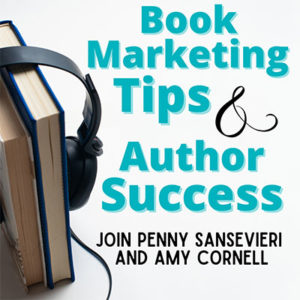A lot of authors think that marketing a self-published book is different – or should be different from a traditionally published book. And while that used to be true, the differences aren’t as extreme as they used to be. Most authors know that in order to be competitive, there needs to be a market match, meaning that your book should look like it belongs and should look as professional as books produced by big publishing houses. This kind of due diligence makes it more likely that your book will get reviewed, or that you’ll get that media interview you’ve been hoping for.
But once a book is produced, authors often scramble to figure out what’s next. Some authors simply doing nothing, or very little. The second is trying to do “all the things” and ending up so distracted you miss out on nailing the basics.
Let’s explore various strategies and techniques that can help you with marketing your self-published book and increase its visibility – from the ground up.
Define your target audience and create a marketing plan.
You should know who your audience is before you put pen to paper, but oddly enough a lot of authors don’t. Often the idea comes first, an idea they can’t wait to put down on paper. When it’s finished, they’re left to try and find the right audience for their book. This happens a lot. I mean, it’s not ideal but if this is you, you’re not alone.
Now though, you have to really buckle down and find the exact right readers for your book. And if your answer is “Well my book is a bit of a blend of these two genres.” Then I’m sending you back to the drawing board because while some books bleed into other areas – like Harry Potter which started as a young adult book and wound up in the hands of many adults, every book – or rather every successful book, needs to start by owning one genre. Pick a lane and own that lane.
So who are the readers that would be most interested in your book?
Once you have a clear understanding of your target audience, you can create a marketing plan that is designed to reach and engage them. This plan should include strategies for online and offline promotion, such as social media marketing, book signings, and collaborations with influencers or book clubs.
By defining your target audience and creating a comprehensive marketing plan, you can effectively promote your self-published book and increase its chances of success because you won’t only be focused on the release, you’ll be ensuring you have marketing activities planned for the first 6 months and beyond.
Build an author platform and establish your online presence.
When I say the term “author platform” in a class I’m teaching, a lot of attendees start to look a little glazed over. I get it, statements like “author brand” and “author platform” seem daunting and non-specific. But let me clarify the two.
Your platform is not who you know, it’s who knows you. It’s your reach. Maybe your platform is your newsletter, or your speaking or your business. If you’re a fiction author your platform may be your social media and your newsletter. It’s really that simple. Though if you’re just starting out, I realize this all doesn’t sound simple: it sounds like work. But a platform isn’t something that’s built in a day, it takes time. Each day you chip away at it, growing it, and expanding your reach. So don’t expect this to be a quick one-and-done thing.
To start, create a professional author website where readers can learn more about you and your work. What you put out online (or what you don’t) is similar to the impression shoppers would get if you had a brick-and-mortar retail store. Too little, they’ll be bored and won’t come up. Too much, they’ll be overwhelmed and still won’t come back.
All of this ties back to your author brand which in it’s simplest form, is your statemen to your readers. It’s how you want to show up in the world. And whether you realize it or not, everything is your brand. From the font on your website, to the font on your book cover. All of it matters.
But getting back to your website for a moment… Keep in mind that your website doesn’t have to be complicated. If you’re just staring out, five pages should be plenty. You’ll want to showcase your work, your author bio, and maybe have a blog to keep in touch with your readers. And don’t forget your author newsletter. You may not have one yet, or maybe you have had one for a while but don’t know what to write – but a newsletter is a fantastic way to stay in touch with your readers. it’s a great way to communicate new releases, events your’re doing, reviews you’ve gotten, or any authors news you want to share!
Utilize social media (strategically) to connect with readers and promote your book.
One of the most popular classes I teach is: How to Market Your Book without Social Media – and it’s popular for a reason. Authors are tired of dumping a lot of time in social media – and I get it. You spend time creating images and videos only to see them barely get noticed.
The issue is that a lot of times authors are on the wrong platforms, or they’re on multiple social media sites that they can’t possibly keep up with. Remember: it’s not about being everywhere, but everywhere that matters. So choose your social media account or accounts wisely – and if you just want to be on one site, that’s great. Find a place where your readers are and make sure you have time to manage it.
Once you decide where you’ll be, you can Interact with your followers by responding to comments, hosting giveaways, and participating in book-related discussions. Collaborate with other authors or influencers in your genre to expand your reach and gain exposure.
Leverage book reviews and endorsements to build credibility.
Positive reviews and endorsements from reputable sources can greatly influence potential readers and increase their trust in your book.
During the book production phase, it’s a great time to start researching bloggers, book reviewers, and influencers that might be interested in your book. Build a list and once the book is out, send them a well-written pitch and offer a free copy of your book. If you have a reader list, or you’re targeting readers in general (maybe on social media) make sure they know that you’re offering them a free copy of your book in exchange for an honest review. Encourage your readers to leave reviews on popular platforms like Amazon and Goodreads. These reviews will not only help build credibility but also improve your book’s visibility in search results.
Additionally, you could seek endorsements from well-known authors or industry experts in your genre. Their endorsement can lend credibility and attract more readers to your book. Display these reviews and endorsements prominently on your book’s website, social media profiles, and promotional materials.
By leveraging book reviews and endorsements, you can establish yourself as a reputable author and attract a larger audience for your self-published book.
Plan, implement, track, repeat.
Creating a plan, even if you just have five things on there, is a great way to create your book marketing roadmap. A book marketing plan doesn’t have be a multi-page complex document, it can be as simple as a list of things you want to accomplish. But the key here is to track your activities. Why? Because if something works really well, you’ll want to be sure and repeat it. By keeping track of what you’re doing, you’ll be able to see a trend – maybe some things aren’t working as you had expected. These items may not make it into your ongoing promotional efforts.
Calendar your activities. For example you may block out a week in Septemer to do an eBook promo in time for “back to school” if the topic of your book relates to this. But also, calendaring will really help you plan, too and it’ll help you to not just plan for the week – but plan ahead. For example, let’s say you want to do a big eBook promotion around Black Friday. If you’re looking for ad space for an eBook discount, those spots fill up quickly. By creating a planning calendar, to compliment your ongoing list, you’ll not only be able to see a few weeks out, but a few months, too.
By implementing effective book launch strategies and promotional campaigns, you can maximize the exposure of your self-published book and attract a larger audience as effectively (if not more effectively) than your traditionally published competitors!
Resources and Free Downloads
8 Things book marketing firms wish authors understood.
Download our free monthly book marketing planner.
Check out all the episodes of our book promotion podcast anywhere you listen to podcasts!
Be sure to sign up for our newsletter on the right-hand side of our blog homepage. If you haven’t opened a recent one your registration may have lapsed!
Definitely follow us on Instagram.
Understand more about what makes an exceptional Amazon retail page.





0 Comments